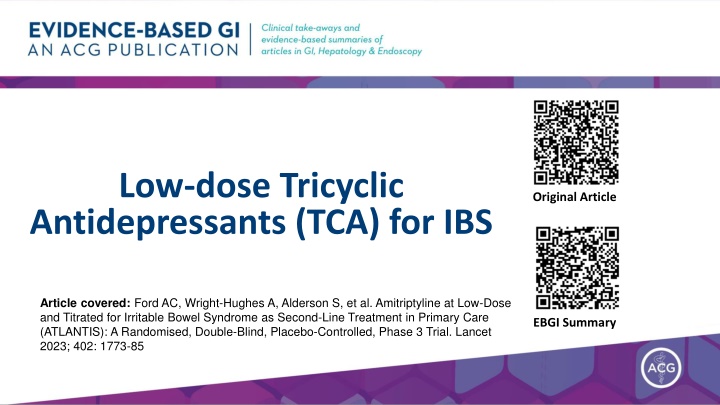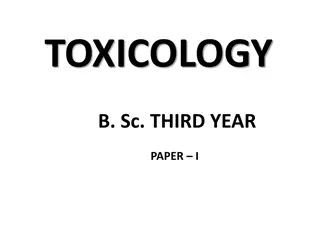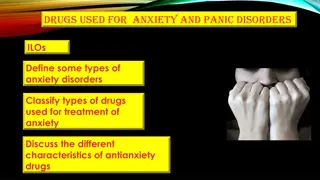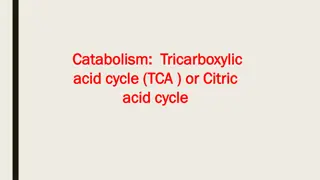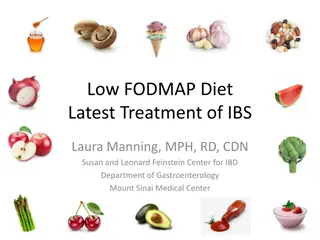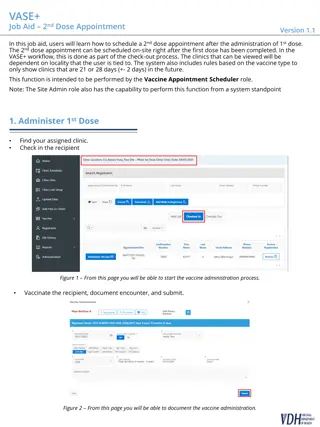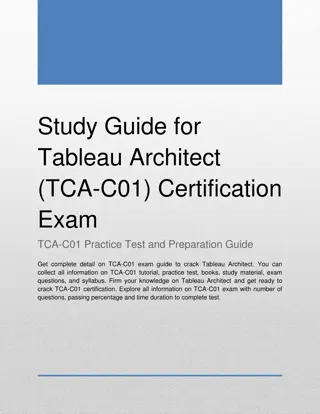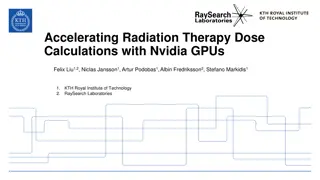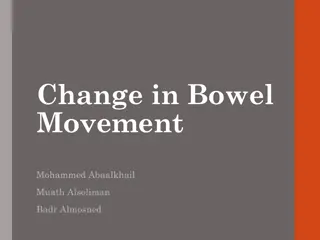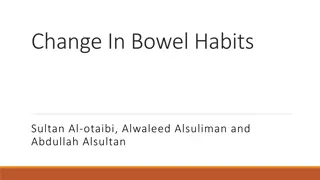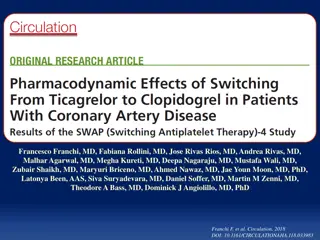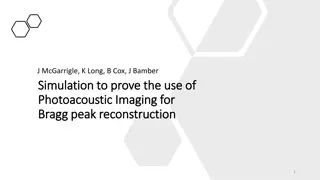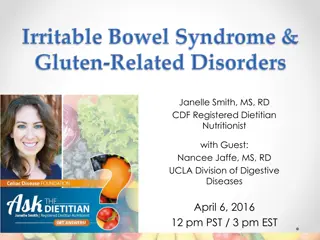Low-Dose Tricyclic Antidepressants (TCA) for IBS: ATLANTIS Study Overview
The ATLANTIS study evaluated the efficacy of low-dose amitriptyline (10-30 mg) in improving Irritable Bowel Syndrome (IBS) symptoms compared to placebo in a 6-month randomized controlled trial in a primary care setting. This important research aims to address the lack of definitive treatment guidelines for IBS by investigating the benefits of using tricyclic antidepressants. The study design involved a multicenter, double-blind, placebo-controlled trial with 55 general practices in England, including patients over 18 years old meeting specific IBS criteria. Patients were randomized to receive either amitriptyline or placebo at bedtime, with dose titration allowed based on symptom response.
Download Presentation

Please find below an Image/Link to download the presentation.
The content on the website is provided AS IS for your information and personal use only. It may not be sold, licensed, or shared on other websites without obtaining consent from the author.If you encounter any issues during the download, it is possible that the publisher has removed the file from their server.
You are allowed to download the files provided on this website for personal or commercial use, subject to the condition that they are used lawfully. All files are the property of their respective owners.
The content on the website is provided AS IS for your information and personal use only. It may not be sold, licensed, or shared on other websites without obtaining consent from the author.
E N D
Presentation Transcript
Low-dose Tricyclic Antidepressants (TCA) for IBS Original Article Article covered: Ford AC, Wright-Hughes A, Alderson S, et al. Amitriptyline at Low-Dose and Titrated for Irritable Bowel Syndrome as Second-Line Treatment in Primary Care (ATLANTIS): A Randomised, Double-Blind, Placebo-Controlled, Phase 3 Trial. Lancet 2023; 402: 1773-85 EBGI Summary
Study Question Is amitriptyline 10 mg-30 mg taken orally at bedtime superior to placebo for improvement in irritable bowel syndrome (IBS) symptoms in the primary care setting at 6 months? Ford et al. Lancet 2023; 402: 1773-85; Schoenfeld P. Evidence-Based GI December 2023: 1-4.
Why is This Important? IBS is very common and debilitating, yet optimal treatment is unclear due to limited randomized controlled trial (RCT) data about multiple commonly-used treatments Studies about tricyclic antidepressant (TCA) use for IBS have various design limitations; therefore, the ACG & AGA guidelines only provide conditional recommendations suggesting that TCAs use in IBS The ATLANTIS study is major effort to quantify the benefit of amitriptyline in a 6-month RCT Ford et al. Lancet 2023; 402: 1773-85; Schoenfeld P. Evidence-Based GI December 2023: 1-4.
Study Design Design: Multicenter, double-blind, placebo RCT with 1:1 randomization Setting: 55 general practices/primary care centers in England Patients: >18 years old with IBS based on ROME IV criteria, IBS-Symptom Severity Score [IBS-SSS] >75 (0-500 scale), normal hemoglobin, normal c-reactive protein, negative anti-tissue transluaminase, no evidence of suicidal ideation, and failure to respond to first-line treatments (e.g., diet modification, soluble fiber, antispasmodics, or laxatives/antidiarrheals) RANDOMIZED 1:1 PLACEBO AMITRIPTYLINE 10MG AT NIGHT Ford et al. Lancet 2023; 402: 1773-85; Schoenfeld P. Evidence-Based GI December 2023: 1-4.
Interventions Amitriptyline 10 mg taken orally at night vs placebo Patients educated to titrate dose upward to max of 3 tablets (30 mg amitriptyline or 3 placebo tablets) over 3 weeks based on improvement in IBS symptoms Throughout the study, patients could further titrate dose up or down based on severity of IBS symptoms or side effects Ford et al. Lancet 2023; 402: 1773-85; Schoenfeld P. Evidence-Based GI December 2023: 1-4.
Outcomes & Definitions Primary endpoint: Change in IBS-SSS from baseline at 6 months IBS-SSS range: 0-500. Mild IBS: 75-175; moderate IBS: 176-300; severe IBS: >300. A change of 35 points in IBS-SSS = minimal clinically important difference. Secondary endpoints: Subjective global assessment of relief of IBS symptoms at 6 months Defined as having somewhat relieved or better based on ordinal scale of global IBS symptoms being: worse; unchanged; somewhat relieved; considerably relieved; or completely relieved compared to baseline Ford et al. Lancet 2023; 402: 1773-85; Schoenfeld P. Evidence-Based GI December 2023: 1-4.
Demographic Data 463 IBS patients were enrolled Mean age: 48-49 years old; 67%-69% female Mean IBS-SSS at baseline = 273; 80% IBS-D or IBS-M 84% normal scores on HADS-Depression instrument 85% moderate-severe IBS based on baseline IBS-SSS Median IBS duration of 10 years Ford et al. Lancet 2023; 402: 1773-85; Schoenfeld P. Evidence-Based GI December 2023: 1-4.
Demographic Data At 6 months, mean IBS-SSS Amitriptyline group: from 273 to 170 Placebo group: from 272 to 200 Mean difference in IBS-SSS score: -27.0; 95% CI: -46.9 to -4.6; P = 0.008 Ford et al. Lancet 2023; 402: 1773-85; Schoenfeld P. Evidence-Based GI December 2023: 1-4.
Results Secondary outcome: Amitriptyline group more likely to achieve at least somewhat relief of global IBS symptoms (OR 1.78, 95% CI 1.19-2.66) or for considerable/complete relief of global IBS symptoms (OR 1.88, 95% CI 1.20-2.95) Side Effects: Discontinuation of study medication due to adverse events was 13% amitriptyline vs 9% placebo Ford et al. Lancet 2023; 402: 1773-85; Schoenfeld P. Evidence-Based GI December 2023: 1-4.
Key Study Findings Amitriptyline was superior to placebo for decreasing IBS-SSS (mean difference in IBS-SSS score: - 27.0; 95% CI: -46.9 to -4.6; p = 0.008) and for achieving somewhat, considerable, or complete relief of global IBS symptoms at 6 months Ford et al. Lancet 2023; 402: 1773-85; Schoenfeld P. Evidence-Based GI December 2023: 1-4.
Study Limitations Benefit observed with amitriptyline was modest. Did not meet the minimal clinically important difference in IBS-SSS reduction of 35 points compared to placebo Rigorous responder endpoints required by US and European agencies for drug trials in IBS-D and IBS-C were not used Inclusion of IBS-C patients (17%) may have decreased the observed benefit of amitriptyline in overall IBS population Ford et al. Lancet 2023; 402: 1773-85; Schoenfeld P. Evidence-Based GI December 2023: 1-4.
How Should We Apply This to Our Practice? How should TCAs be positioned in the therapeutic armamentarium for IBS? Which IBS patients may not be good candidates for TCA therapy? How do you counsel patients to titrate low dose TCAs? How do you counsel about success of TCAs for IBS symptoms? Schoenfeld P. Evidence-Based GI December 2023: 1-4.
